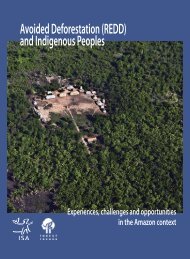BASELINE STUDY 5, Thailand - Forest Trends
BASELINE STUDY 5, Thailand - Forest Trends
BASELINE STUDY 5, Thailand - Forest Trends
Create successful ePaper yourself
Turn your PDF publications into a flip-book with our unique Google optimized e-Paper software.
Office of the Rubber Replanting Aid Fund (ORRAF) is involved in the promotion, financing and control of the<br />
development of rubber plantations. ORRAF provides rubber plantation technology to farmers and subsidizes<br />
the cost of replanting rubber. Recently, other crops (including teak, dipterocarps and oil palm) have been included<br />
in the support program (FAO 2009:44). ORRAF is aware of the importance of wood revenue for farmers,<br />
but this is seen as a complementary element in the replanting phase. There is little coordination with <strong>Thailand</strong>’s<br />
rubberwood processing industry although information on plantation areas has been made available to the<br />
wood industry.<br />
Ministry of Interior<br />
The policy of the Royal Thai Government is to promote decentralization 25 by strengthening lines of representation<br />
and downward accountability from provincial governors to districts (amphoe), sub-districts (tambon) and<br />
villages (baan). Many levels of decentralised state administration fall under the authority of the Ministry of Interior.<br />
For example, the Ministry of Interior’s Local Administration Department includes the office of the Governor<br />
of the different provinces, who is responsible for the actions of provincial and district RFD forest officers.<br />
There is also a <strong>Forest</strong> Policy Unit of the Police Department who assists in forest protection and patrolling for<br />
illegal forest activities. Historically, there has been much bureaucratic competition between natural resource<br />
agencies such as the RFD and the Ministry of the Interior (Vandergeest and Peluso 1995).<br />
The following levels of state administration which fall under the authority of the Ministry of the Interior are also<br />
relevant for the forest-land sector:<br />
Department of Special Investigation – has the jurisdiction and has investigated illegal timber smuggling operations,<br />
sometimes in cooperation with National Anti-Corruption Commission that probes smuggling cases.<br />
Provincial Administrative Organizations (PAO): There are 75 provinces in <strong>Thailand</strong>, each with a PAO that includes<br />
representatives from the MONRE and provincial representatives of the RFD.<br />
District Authorities (Amphoe) 26 : Along with the Provincial <strong>Forest</strong>ry Offices, District Offices should be involved in<br />
approving local forest management plans. According to ITTO (2006:112) there has been little guidance on these<br />
matters, however. In terms of environmental governance, key local representatives of the Ministry of the Interior,<br />
such as the Provincial Governors or the District Heads (nai Amphoe), are often the key actors who adjudicate<br />
conflicts over natural resources (Garden et al. 2011:151).<br />
Sub-District Authorities (Tambon Administrative Organization, TAO) 27 : The TAO Council is the lowest level of<br />
the local government administrative structure. It is made up of the tambon chief (kamnan), the village headmen<br />
from each village in the tambon and the tambon health officer, and two elected members from each village<br />
in the tambon (ITTO 2006:89). There are more than 7,000 sub-districts in <strong>Thailand</strong>, and the capacities and<br />
resources available to different TAOs vary significantly. The sub-district heads (kamnan) and the village leaders<br />
(phu yai ban) are the key “local officials” that play key roles in natural resource management issues (Garden et<br />
al. 2011).<br />
25 Recent moves towards local decentralisation have at times been resisted by powerful state bureaucracies, and the decentralisation<br />
process in <strong>Thailand</strong> can be best described as an incomplete and ongoing process. Nevertheless the powerful<br />
National Decentralization Committee continues to push reforms forward, and Garden et al (2011:156) state that while<br />
decentralization has not been a panacea for more effective and accountable governance in <strong>Thailand</strong>, the empowered subdistrict<br />
administrative councils (TAOs) have emerged as “a viable form of local government and an arena for relevant politics.”<br />
26 There are 876 districts in <strong>Thailand</strong>, about 10 per province.<br />
27 Approximately ten tambons comprise an amphoe.<br />
© EU FLEGT Facility, <strong>BASELINE</strong> <strong>STUDY</strong> 5, <strong>Thailand</strong>: Overview of <strong>Forest</strong> Law Enforcement, Governance and Trade, July 2011<br />
This Action is funded by the European Union and the governments of Finland, France, Germany, the Netherlands, Spain and the UK. The views expressed herein<br />
can in no way be taken to reflect the official opinion of the European Union.<br />
www.euflegt.efi.int<br />
49
















